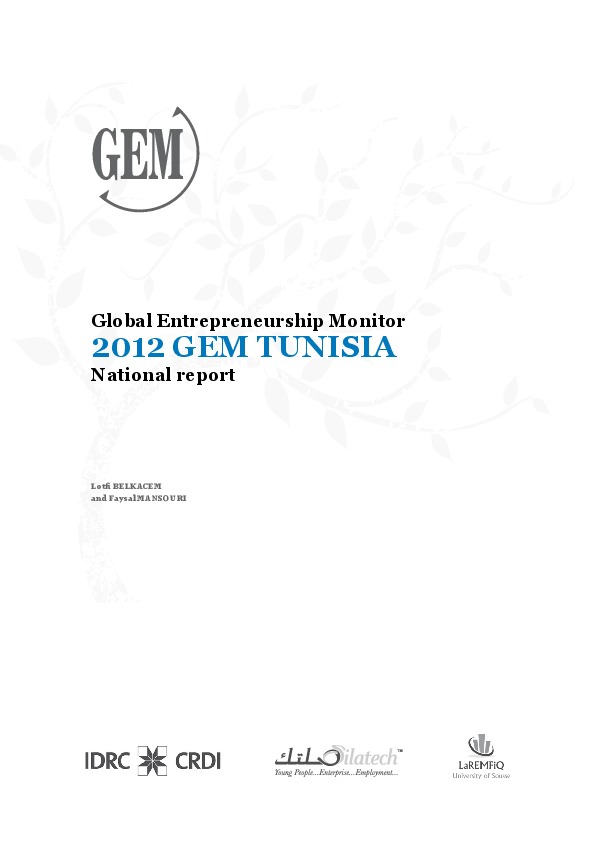GEM Tunisia 2012 Report

- Year of publication: 2013
- Category: National Reports
- Language: English
- Upload date: 2016-03-31
Entrepreneurship has, in recent years, become a main policy focus in Tunisia. TEA rate has fallen, compared to 2009 and 2010 to 4.8%. TEA rate for Tunisia is made up of 2.38% adult population engaged in nascent entrepreneurial activity and 2.48% for adult population already involved in ownership of a young business. Nascent entrepreneurship rate has observed a slight increase from 2.2% in 2009 to 2.4% in 2012 while new business rate declined from 7.2% in 2009 to 2.5% in 2012. Results indicate a lift in the business failure rate created beyond the start-up phase explained by an economic environment strongly affected by the social and political unrest following the 2011 revolution. There is a tendency to decline in the total early stage entrepreneurial activity in the youth population from 9 to 2.32 from 2009 to 2012 due mainly to structural factors inherent to the economy and society. In 2012, Tunisians are incidentally less vulnerable vis-à-vis risk of business failure and only 15% of the population between 18 and 64 years expresses their fear of failure compared to a higher risk perception of 34% in 2009 prior to the revolution. Tunisia nascent entrepreneurship remains more driven by improvement- than by necessity in 2009-2012. Nonetheless, the gap between necessity and opportunity entrepreneurship has lessened in 2012 indicating a shift in the quality of entrepreneurship. APS results confirm the persistence of the gender gap with respectively a TEA rate of 6.75% for male and 2.87% for female. Moreover, women in Tunisia are more likely to be opportunity-motivated and the survival rate of Tunisian women’s business is lower. New entrepreneurs are more often associated with smaller businesses and necessity-based entrepreneurship. Grand Tunis and south-west regions have the lowest TEA rates (4.1% and 3.6%) in the country. South East and the Center East have the highest regional TEA with respectively 6.1% and 5.3%. Sidi Bouzid, one of the governorates that triggers the revolution in the country, has the highest necessity TEA in the Tunisia while the highest opportunity entrepreneurship is observed in the Grand Tunis and East Coast. An analysis of entrepreneurs’ network structure in Tunisia highlights the importance of private entrepreneurs’ network and indicates that strong ties with family, perhaps through providing intangibles such as emotional support and tangible resources, could have a positive impact on firm survival. More precisely, results show that 51% of Tunisian entrepreneurs consult widely their private environment composed of spouse, parents, other family members and friends and only 4% take advises from their current boss, colleagues, people who started businesses and people experienced in the businesses. The findings also reveal that the entrepreneurs’ network in Tunisia is not diversified and is limited only to the social private network made up of the family and parental relations. An analysis of the opinions of national experts on the benefits of the current conditions of entrepreneurial activity in Tunisia, stresses the positive role of available public programs, regulatory framework, developed physical and commercial infrastructure conducive to investment and entrepreneurship.
